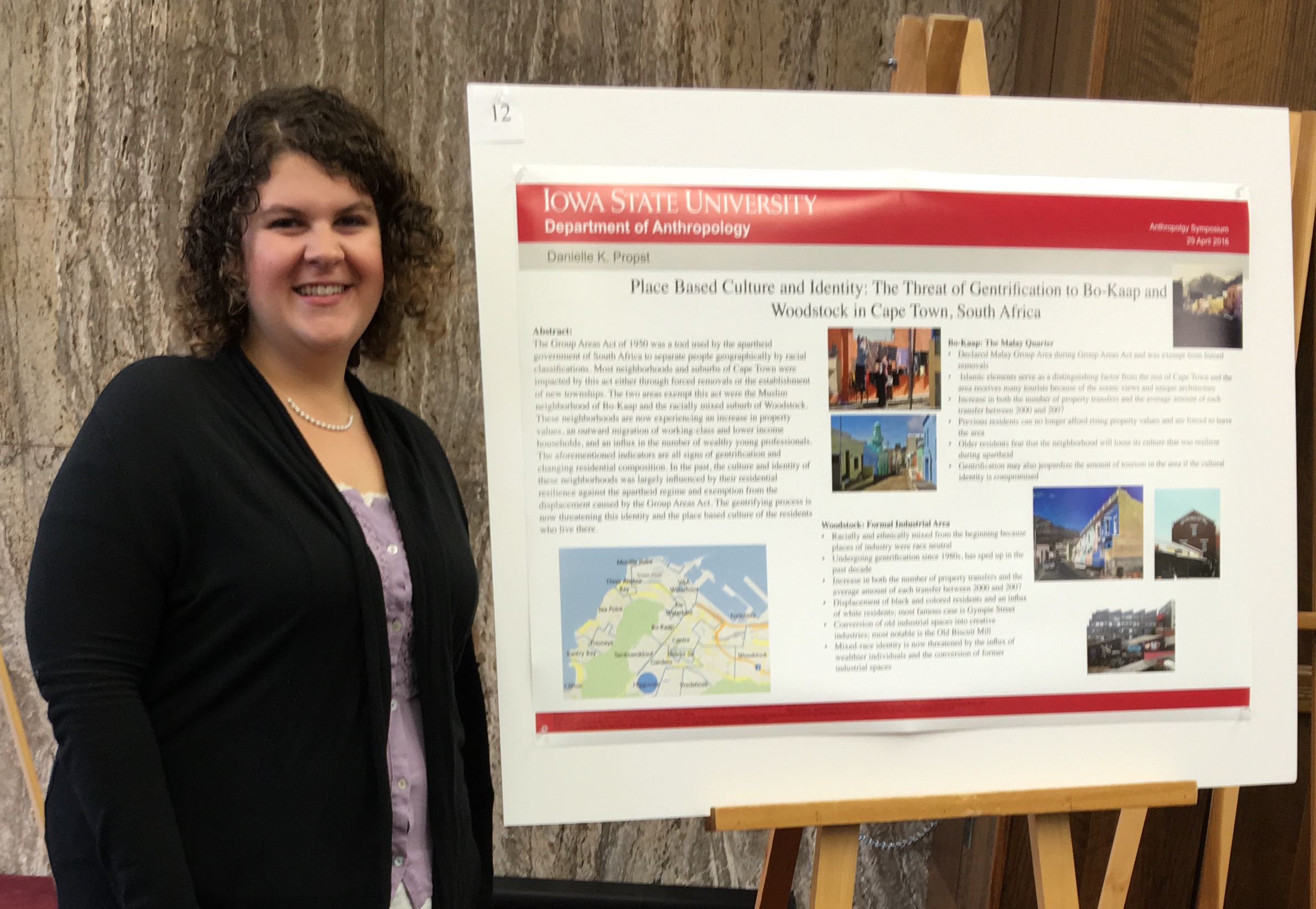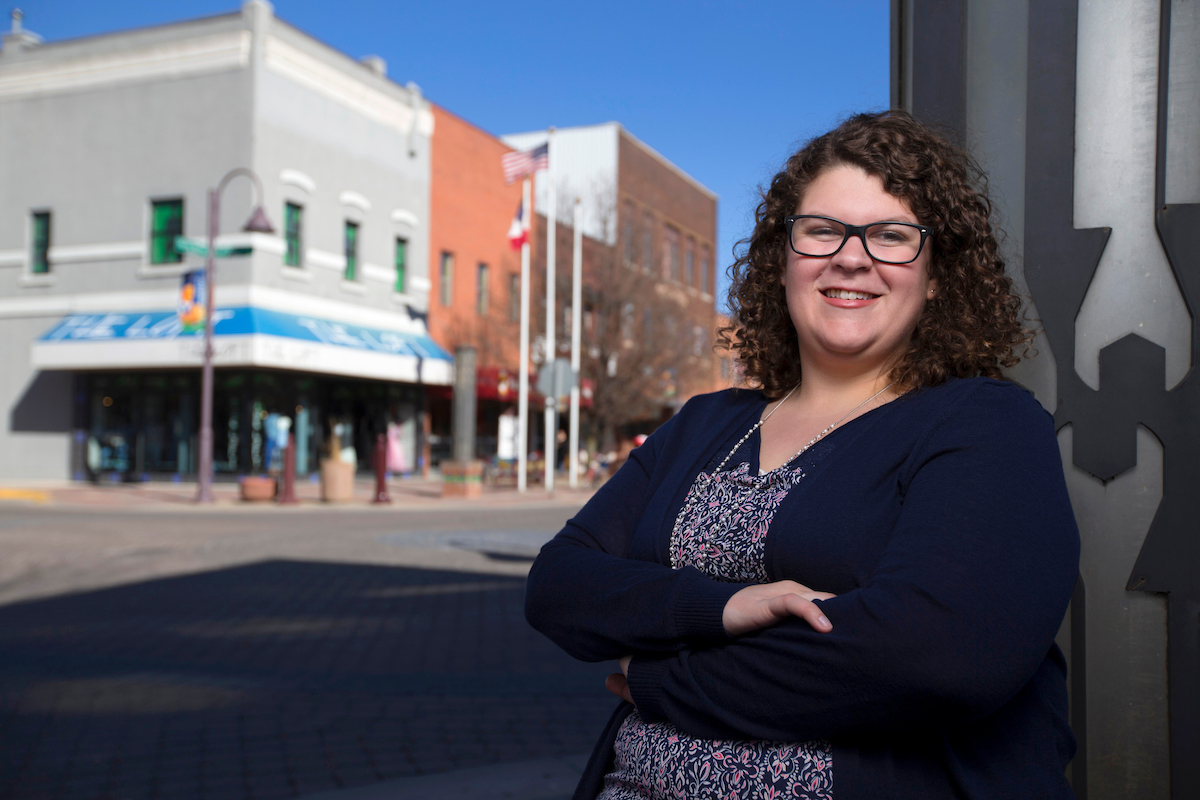Long before she could spell “anthropology,” Danielle Propst ('17 anthropology and community and regional planning) was curious about her neighborhood in Marshalltown, Iowa, and the people around her.
“Growing up, I lived next door to the nursing home where my grandma lived,” she said. “I could see her window from our backyard and wave at her. There weren't a lot of kids in my neighborhood growing up, so it was a great place to hang out and get to know the residents. Most of my socialization was visiting the nursing home."
She did not know then that her walk next door to visit her friends was a product of city planning. Now Propst wants to plan neighborhoods herself, combining anthropology and design to create thriving communities. Her passion for service is one reason why she is being honored this spring with the Wallace E. Barron All-University Senior Award from the Iowa State University Alumni Association.
Creating connections
Propst’s mother, an Iowa State alumna, always nudged her daughter to follow her footsteps to Ames.
“As any teenager would have, I rebelled,” Propst joked. She instead enrolled in a small private college in Minnesota, but it didn’t feel right and she transferred to Iowa State in 2014.
“I love Iowa State. I feel more connected at Iowa State at a university of 36,000 people than I did at a school of 1,900 people. Here there is such a diversity of student body and opinions. You can find your place and then mix among those places.”
“I love Iowa State. I feel more connected at Iowa State at a university of 36,000 people than I did at a school of 1,900 people. Here there is such a diversity of student body and opinions. You can find your place and then mix among those places.”
Propst found her place through her Professional Preparation in Anthropology class, when a faculty member visited from the Department of Community and Regional Planning in the College of Design.
The collaboration between the two colleges gave Propst a blueprint for her future career. After learning how the disciplines complemented each other, she decided to pursue dual degrees.
"Danielle is the first student I know of who has proceeded to double major in anthropology and community and regional planning," Max Viatori, associate professor of anthropology, said. "Cultural anthropology is so much about finding different ways to engage with communities and people around the world and different cultural, social and political situations. We teach our students how to work in multicultural settings, but also provide them with research tools for engaging with communities and studying the needs and issues affecting those communities at a particular point in time. And those are wonderful tools for designers. It's an innovative thing Danielle has done to pull those two programs together."
Employers ranging from Microsoft to nonprofits are looking for anthropologists who bring skills to fields such as market research or participatory design, Viatori said.
Or, in Propst's case, community planning.
“Anthropology gives me the tools to identify problems and areas of growth within the community," she said. "Community and Regional Planning lets me take that one step further with things we can do to fix housing or bring more jobs to the community.”
A wider look
In the summer of 2015, Propst traveled to Cape Town, South Africa, for a four-week housing and development program. Assisted by an LAS scholarship, she lived with a Muslim family in the Bo-Kaap neighborhood, an area that was exempt from forced removals during apartheid and retained a specific cultural identity.
"They lived in an old house that was built in 1890 and had been in the family since that time," she said of her host family. "They love their neighborhood because they know everyone there, but it is losing a sense of shared culture due to the influx of gentrification."

She also interviewed residents of informal settlements, asking questions like, “What do you need right now?” or “How can your city help you?”
“It was an eye-opening experience. They weren’t negative answers, like I expected. They were things like ‘We could use better plumbing or the lighting isn’t great.’”
The experience confirmed her interest in housing, and she later did an independent study project on housing and gentrification culture that she presented at Iowa State’s Anthropology Symposium.

“Anthropology allows me to take that wider look and use methods to actually get perspectives from people that actually live in a community and have those experiences. Instead of a top down approach with people imposing ideas, you get ideas generated from the bottom up.”
“Anthropology allows me to take that wider look and use methods to actually get perspectives from people that actually live in a community and have those experiences."
A city of stories
Propst is currently interning at ISG in Des Moines, an architecture, engineering, environmental and planning strategy firm. After graduation, she hopes to stay in the Midwest and find a position where she can use her skills to impact a specific city neighborhood.
“I like looking at what cities can portray to the outside world," she said.
So if she designed a city tomorrow, what story would it tell?
“It would be an equitable city," Propst said. "A city related to social justice where everyone has a fair shot and access to food, shelter, adequate economic opportunities and adequate education systems. A city where community development and economic development are paired together and not in isolation from each other.”
Her own pairing of anthropology and community and regional planning has prepared her for just that challenge.
